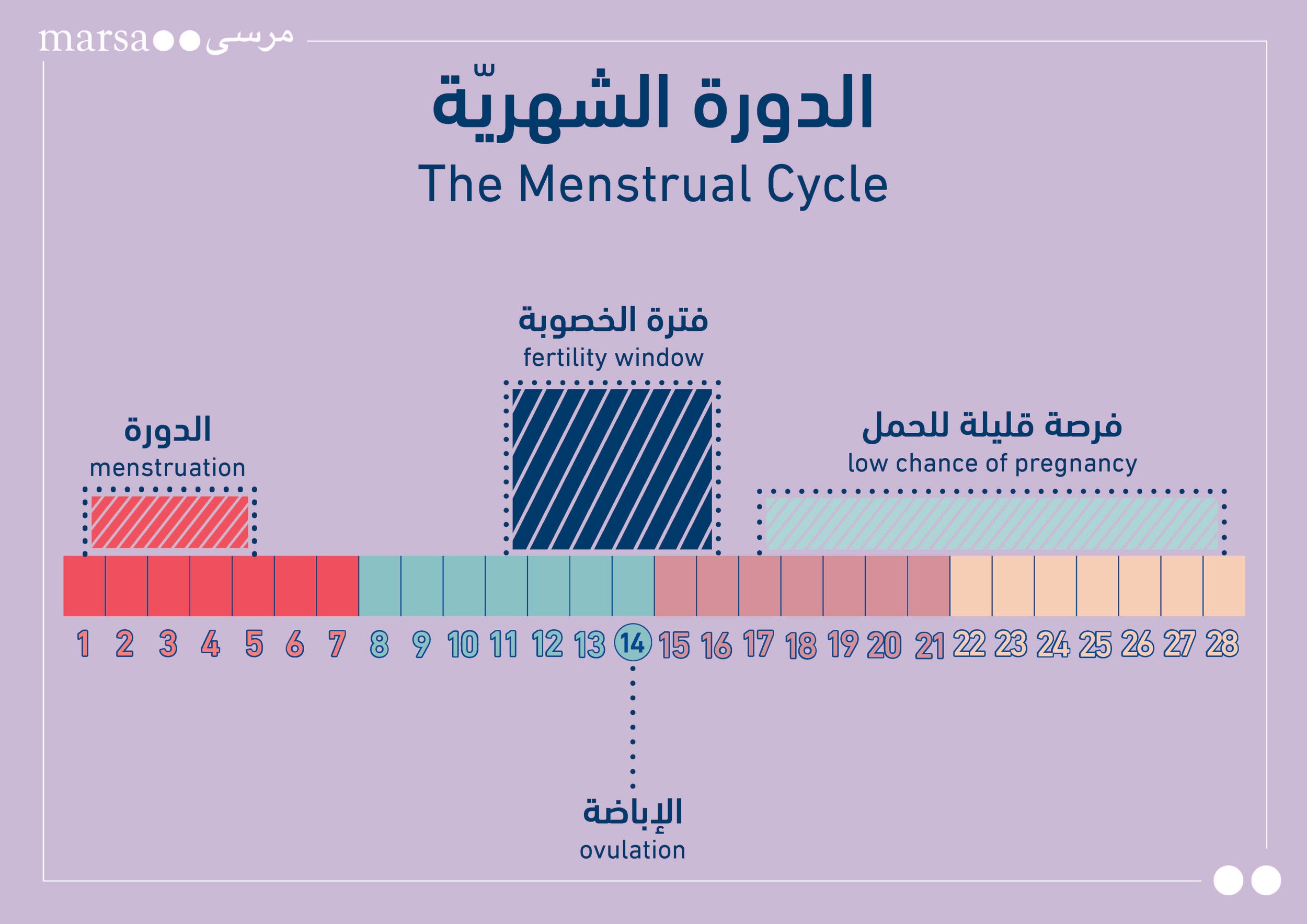The Menstrual Cycle
The menstrual cycle is a natural process involving hormonal changes and physical preparation for a potential pregnancy. It is marked by the time between the first day of the current menstruation and the first day of the next one, with an average length of 28 days, but can differ for each individual.
Stages of the cycle :
Menstruation (3 to 7 days):
The menstrual cycle begins with menstruation, which is when the lining of the uterus starts shedding, causing bleeding. This process prepares the endometrium to receive the fetus in case of pregnancy.
During this phase, the hormonal levels of estrogen and progesterone decrease and might cause:
Bloating.
Emotional sensitivity, anxiety, irritation, and mood changes.
Cramps in the lower abdomen and the back.
Food craving.
Breast tenderness.
Acne.
Follicular phase:
This phase is marked from the first day of menstruation until ovulation.
The follicles, which contain eggs, start developing in the ovaries, during which the follicle-stimulating hormone (FSH) is released, leading to follicle growth and development. The luteinizing hormone (LH), in turn, stimulates egg release and the elevation of the estrogen hormone, causing the lining of the uterus to grow and thicken. Throughout this phase, individuals may sense :
An increase in discharge.
Improved mood.
An increase in libido and sexual desire.
Ovulation:
Ovulation starts towards the middle of the cycle (around day 14 in a regular 28-day menstruation cycle) and is called the fertility period. It is when the mature egg is released from the ovary and travels down the fallopian tube, potentially ready for fertilization. During this phase, the level of hormones increases and might cause:
Change in discharge (thinner, clear, and stretchy, promoting sperm movement).
Increase in libido and sexual desire.
Ovulatory pelvic pain.
Luteal phase:
This phase starts after the ovulation. It is when the ruptured follicle transforms into the corpus luteum, producing progesterone and a slight increase in estrogen levels, causing the lining of the uterus to thicken in anticipation of a pregnancy. If the egg is fertilized by a sperm, pregnancy occurs; otherwise, estrogen and progesterone levels drop and the thick lining of the uterus sheds during the period. During the Luteal phase, individuals may experience:
Bloating and food craving,
Emotional sensitivity, anxiety, irritability, and mood changes.
Cramps in the lower abdomen and back.
Breast tenderness.
Acne.
Menopause
Menopause is a natural biological process that usually occurs between the ages of 45 and 55. It is defined by menstrual cessation for 12 consecutive months and marks the end of the reproductive phase of life. Menopause can also occur prematurely before the age of 40. During this stage, the ovaries stop releasing eggs and hormonal production decreases significantly.
Perimenopause is the transitional phase that leads up to menopause, lasting for around 4 years before reaching menopause, commonly occurring during one’s 30s to 40s. It is defined by a decrease in hormonal levels, irregular periods, and low chances of pregnancy.
Symptoms of perimenopause vary between individuals and may include:
Hot flashes.
Insomnia and night sweats.
Frustration and mood swings.
Weight changes.
Vaginal dryness and decrease in libido.
Forgetfulness and lack of concentration.
Heart palpitations.
Frequent urination.
Postmenopause occurs after menopause is reached, following the phase of period cessation for 12 consecutive months, during which symptoms start decreasing and hormone levels drop gradually. During postmenopause, regular medical checkups are necessary in order to prevent serious health conditions that could potentially be caused by the drop in hormonal levels, such as:
Change in bone density that increases the risk of osteoporosis.
Cardiovascular problems.
Weakening of the pelvic support structures increases the risk of pelvic organ prolapse (which can be avoided by performing kegel exercises).
Lifestyle after menopause
Menopause marks the beginning of a new chapter and embracing this transition gives us the chance to shift our focus towards nurturing ourselves and prioritizing our wellbeing.
The conclusion of monthly cycles allows for more time and freedom to devote to self-care, try out new things, and engage in a healthier lifestyle.
Here are some tips for staying healthy after menopause:
Stay active and maintain a healthy diet.
Avoid substances such as nicotine, alcohol, caffeine, and drugs.
Practice kegel exercises to avoid pelvic organ prolapse.
Take supplements if needed.
Visit your doctor regularly and consider seeking psychological support if needed.
Menopause and sexuality
Menopausal people are at a higher STI risk due to vaginal dryness which can cause irritation and small cuts or tears during sex. Using condoms and water-based lubricants is essential for maintaining a healthy and pleasurable sexual relationship, and can even be an opportunity to experience pleasure in new ways.
A satisfying sexual life is possible through:
Self-exploration.
Open communication about desires, pleasure areas, feelings, and concerns.
Water-based lubricants to enhance comfort and pleasure.
Finding new ways, positions, and fantasies to explore.
Sex toys incorporation.
Extending foreplay to increase arousal and lubrication.
Pelvic floor exercises to increase sexual sensations.
Written by:
Cristel Lahoud | Sexual health educator, midwife
Cristel Lahoud is a sexual health educator at Marsa, holding a Bachelor's degree in Midwifery and currently pursuing a Master's degree in Clinical Psychology. Her profound dedication lies in raising awareness and promoting advocacy for both sexual and reproductive health.

